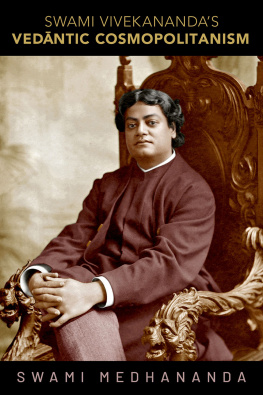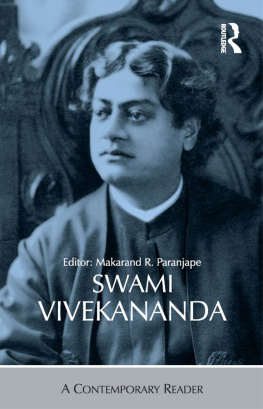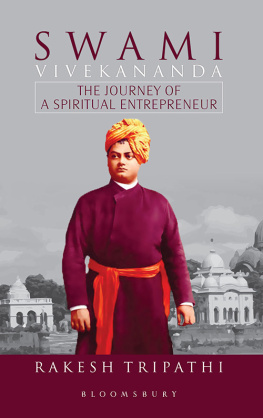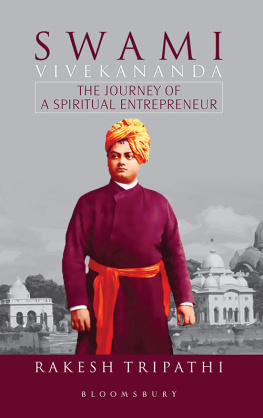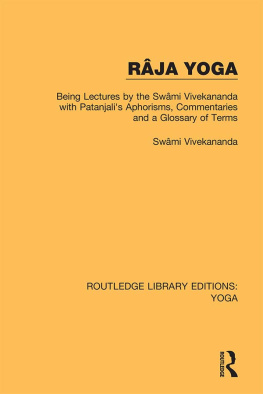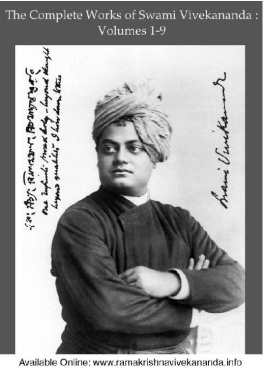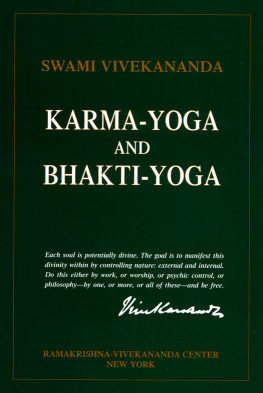Swami Vivekanandas Vedntic Cosmopolitanism

Oxford University Press is a department of the University of Oxford. It furthers the Universitys objective of excellence in research, scholarship, and education by publishing worldwide. Oxford is a registered trade mark of Oxford University Press in the UK and certain other countries.
Published in the United States of America by Oxford University Press
198 Madison Avenue, New York, NY 10016, United States of America.
Oxford University Press 2022
All rights reserved. No part of this publication may be reproduced, stored in a retrieval system, or transmitted, in any form or by any means, without the prior permission in writing of Oxford University Press, or as expressly permitted by law, by license, or under terms agreed with the appropriate reproduction rights organization. Inquiries concerning reproduction outside the scope of the above should be sent to the Rights Department, Oxford University Press, at the address above.
You must not circulate this work in any other form and you must impose this same condition on any acquirer.
Library of Congress Cataloging-in-Publication Data
Names: Medhananda, Swami, author.
Title: Swami Vivekanandas vedantic cosmopolitanism / Swami Medhananda.
Description: New York, NY, United States of America : Oxford University Press, 2022. |
Includes bibliographical references and index.
Identifiers: LCCN 2021037343 (print) | LCCN 2021037344 (ebook) |
ISBN 9780197624463 (hardback) | ISBN 9780197624470 | ISBN 9780197624494 |
ISBN 9780197624487 (epub)
Subjects: LCSH: Vivekananda, Swami, 18631902.
Classification: LCC BL1280.292.V58 M43 2022 (print) |
LCC BL1280.292.V58 (ebook) | DDC 294.5/55092dc23
LC record available at https://lccn.loc.gov/2021037343
LC ebook record available at https://lccn.loc.gov/2021037344
DOI: 10.1093/oso/9780197624463.001.0001
motto , ,
(- )
My motto is to learn whatever is great wherever I may find it.
Swami Vivekananda(1890 Letter to Svm Akhananda)
Contents
I am grateful to Revered Swami Muktidananda for providing me with an intellectually and spiritually congenial atmosphere to conduct research at the Ramakrishna Institute of Moral and Spiritual Education. In the course of researching and writing this book, I benefited from conversations with the following scholars: Ermine Algaier, Rupa Bandyopadhyay, Arindam Chakrabarti, Amit Churvedi, Nilanjan Das, Matthew Dasti, Jonardon Ganeri, Jonathan Gold, Malcolm Keating, James Madaio, Joseph Milillo, Arpita Mitra, Todd Leroy Perreira, Stephen Phillips, Sister Gayatri Prana, Anantanand Rambachan, Prabal Kumar Sen, Itay Shani, Linda Simon, and Anand Vaidya. For insightful feedback on one or more chapters of the book, I am grateful to Jonardon Ganeri, Itay Shani, Anand Vaidya, Norris Frederick, Matt Seidel, Joseph Milillo, Swami Mahayogananda, Swami Chidekananda, and four anonymous peer reviewers for Oxford University Press. I also had helpful discussions with the following monks of the Ramakrishna Order: Revered Swamis Shivavratananda, Atmavidananda, Bhajanananda, Nityasthananda, Atmarupananda, Atmapriyananda, Balabhadrananda, Muktidananda, Sarvapriyananda, Divyasukhananda, Chandrakantananda, Chidvikashananda, Mahayogananda, Vedanishthananda, Harinamananda, Sukalyanananda, Paramahamsananda, Vedarthananda, Tadvratananda, Pravrajika Vrajaprana, and Brahmacharis Subrata and Nachiketa.
Joseph Milillo, Apala Das, Swami Mahamedhananda, and Brahmachari Nachiketa kindly sent me articles and book chapters that I had trouble finding in local libraries. Swami Atmarupananda provided me with more accurate and precise dates and titles of some of Vivekanandas lectures and writings than the dates and titles found in the Complete Works. Swami Divyavibhananda, Head Librarian at the Ramakrishna Mission Institute of Culture, and Swami Bhavantakananda, Head Librarian at RKMVERI, kindly allowed me to use their libraries to my hearts content. I would also like to thank Hannah Doyle and Lucy Randall at Oxford University Press for their support and guidance throughout the process.
Finally, I owe a special debt of gratitude to Most Revered Swami Smaranananda, President of the Ramakrishna Math and Mission, and Revered Swami Suvirananda, General Secretary of the Ramakrishna Math and Mission, for their kind encouragement and unfailing support of my work. It should be noted that this book was not vetted in any way by the Ramakrishna Order. All views expressed in this book are mine alone.
Texts Relating to Swami Vivekananda
[Throughout this book, whenever I cite a passage from any of the works listed below, I use parenthetical citations in the body of the text. In case of multi-volume works like The Complete Works of Swami Vivekananda (CW), I cite the abbreviated title, followed by the volume number and page number. Whenever I cite a passage from an originally Bengali text written or spoken by Vivekananda, I first cite the Bengali original and then the English translation.]
| CW | Vivekananda, Swami. [19571997] 20062007. The Complete Works of Swami Vivekananda: Mayavati Memorial Edition. 9 vols. Calcutta: Advaita Ashrama. |
| BCW | Viveknanda, Svm. [1964] 2009. Svm Viveknander V o Racan, fourth edition. 10 vols. Kolkt: Udbodhan. |
| LSV | Anonymous. 1989. The Life of Swami Vivekananda by His Eastern and Western Disciples, sixth edition. 2 vols. Kolkata: Advaita Ashrama. |
Texts Relating to Sri Ramakrishna
[Whenever I cite a passage from , I first cite the volume number, fascicle number, and page number of the Bengali text (LP) and then cite the page number of Swami Chetananandas single-volume English translation (DP).]
| K | Gupta, Mahendranth. [19021932] 2010. rrrmakakathmta: rma-kathita. 1 vol. Kolkt: Udbodhan. |
| G | Gupta, Mahendranath. [1942] 1992. The Gospel of Sri Ramakrishna, translated by Swami Nikhilananda. New York: Ramakrishna-Vedanta Center. |
| LP | Sradnanda, Svm. [19091919] 2009. rrrmakallprasaga. 2 vols. Kolkt: Udbodhan. Volume 1 contains three separately paginated fascicles, and Volume 2 contains two separately paginated fascicles. |
| DP | Saradananda, Swami. 2003. Sri Ramakrishna and His Divine Play, translated by Swami Chetanananda. St. Louis: Vedanta Society of St. Louis. |
Sanskrit Commentaries of ankarcrya
[Unless otherwise noted, translations of Sanskrit passages from akarcryas commentaries are my own.]
| BSBh | akarcrya. 2007. Brahmastram: karabhyopetam. Delhi: Motilal Banarsidass. |
| BhGBh | akarcrya. 2012. rmadbhagavadgt karabhya Hind-anuvdasahita. Gorakhpur: Gita Press. |
| BUpBh | akarcrya. 2013. Bhadrayaka Upaniad. Gorakhpur: Gita Press. |
| UpBh | ankaracarya. 2011. Isadi Nau Upanisad: nkarabhasyartha. Gorakhpur: Gita Press. |
Works by Immanuel Kant
[As is standard in Kant scholarship, I cite the Critique of Pure Reason using the A/B edition pagination, and I cite all other works by volume and page of the Akademie Ausgabe (Ak.): Immanuel Kant,

